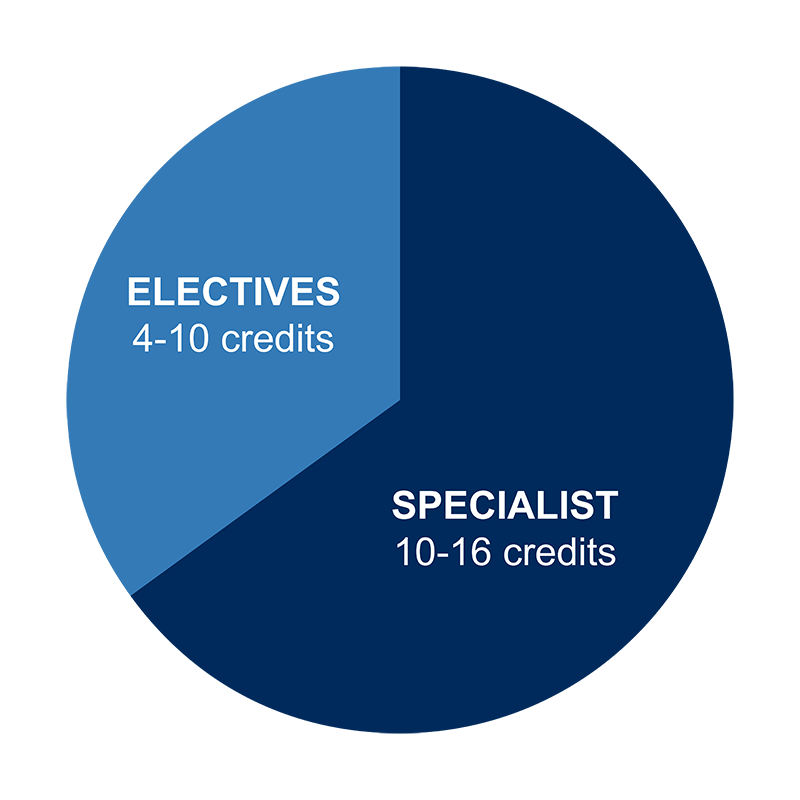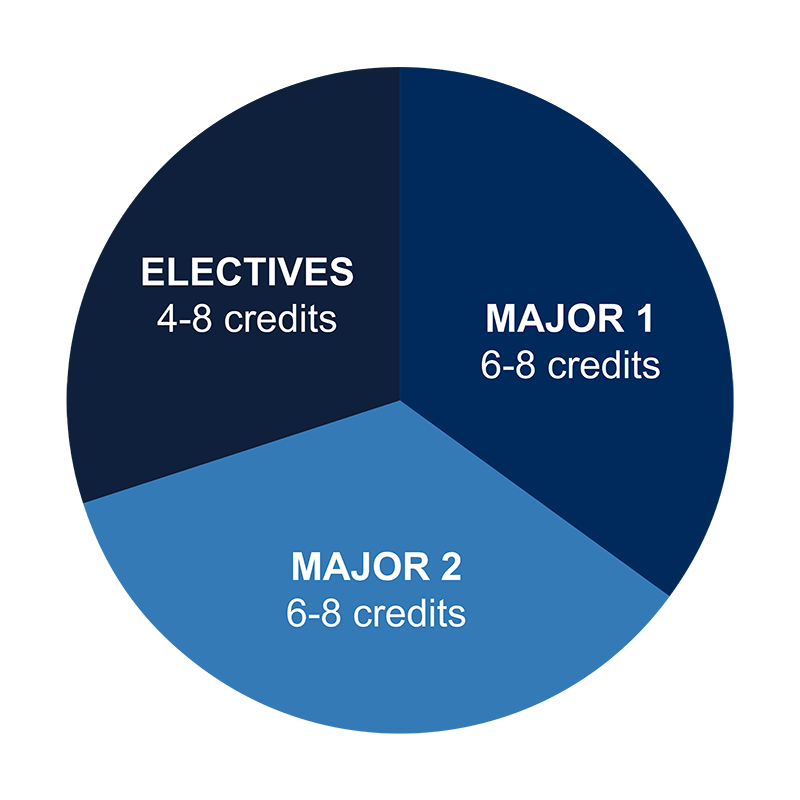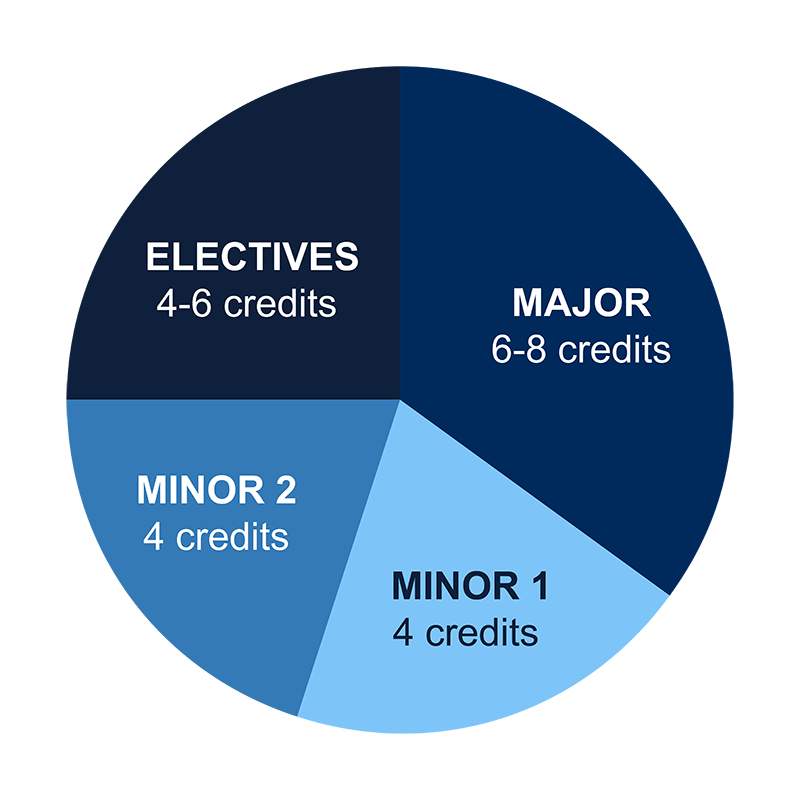Canada’s Top Programs
With more than 400 academic programs, the Faculty of Arts & Science is one of Canada’s largest and most research-intensive institutions.
From criminology and neuroscience to psychology and economics, our programs are among the world’s best, according to the annual QS World University Rankings.
With so many program choices, you will also have the flexibility to take courses and combine programs in widely different areas to diversify your knowledge and skills.

Explore Programs by Admission Category
A program is a group of courses taken in a specific subject area. For example, history, computer science or economics. Our 390+ programs are categorized into six admission categories. When you apply to the Faculty of Arts & Science, you will apply to one of the admission categories below based on which programs interest you.
Click on the admission category name to see the list of associated programs.
| Program | High School Subject(s) Required in Addition to English |
|---|---|
| Applied Data Science | Calculus |
| Computer Science | Calculus |
| Data Science | Calculus |
Legend:
J: This program of study is jointly listed under the Humanities and Social Sciences admission categories. This means that on your application, you can apply to either the Humanities or the Social Sciences admission category.
Legend:
Bio: Biology; C: Calculus; Ch: Chemistry; Ph: Physics
Rec.: Recommended but not required
| Program | High School Subject(s) Required in Addition to English |
|---|---|
| Animal Physiology | C, Bio, Ch (Rec. Ph) |
| Anthropology: Evolutionary | C, Bio, Ch (Rec. Ph) |
| Applied Genetics and Biotechnology | C, Bio, Ch (Rec. Ph) |
| Biochemistry | C, Bio, Ch (Rec. Ph) |
| Biodiversity and Conservation Biology | C, Bio |
| Bioinformatics and Computational Biology | C, Bio, Ch |
| Biological Chemistry | C, Bio, Ch (Rec. Ph) |
| Biological Physics | C, Bio, Ch, Ph |
| Biology | C, Bio, Ch (Ch not Req'd for minor) |
| Biomedical Toxicology | C, Bio, Ch (Rec. Ph) |
| Cell and Molecular Biology | C, Bio, Ch, Ph (Ph rec not Req'd for major) |
| Ecology and Evolutionary Biology | C, Bio, Ch |
| Environment and Behaviour | C (Rec. Bio) |
| Environment and Energy | C, Ch (Rec. Ph) |
| Environment and Health | C, Bio, Ch (Rec. Ph) |
| Environment and Toxicology | C, Bio, Ch (Rec. Ph) |
| Environmental Biology | C, Bio, Ch (Ch not Req'd for minor) |
| Environmental Chemistry | C, Bio, Ch (Rec. Ph) |
| Environmental Geosciences | C, Bio, Ch (Rec. Ph) |
| Environmental Science | C, Bio, Ch (Rec. Ph) |
| Forest Conservation Science | C, Bio (Rec. Ch) |
| Genome Biology | C, Bio, Ch |
| Global Health | C, Bio, Ch (Rec. Ph) |
| Health and Disease | C, Bio, Ch (Rec. Ph) |
| Human Biology | C, Bio, Ch (Rec. Ph) |
| Immunology | C, Bio, Ch (Rec. Ph) |
| Molecular Genetics and Microbiology | C, Bio, Ch (Rec. Ph) |
| Neuroscience | C, Bio, Ch (Rec. Ph) |
| Nutritional Sciences | C, Bio, Ch |
| Pathobiology | C, Bio, Ch (Rec. Ph) |
| Pharmaceutical Chemistry | C, Bio, Ch, Ph |
| Pharmacology | C, Bio, Ch (Rec. Ph) |
| Pharmacology and Biomedical Toxicology | C, Bio, Ch (Rec. Ph) |
| Physiology | C, Bio, Ch (Rec. Ph) |
| Psychology | C, Bio (Rec. Ch, Ph) |
| Psychology Research | C, Bio (Rec. Ch or Ph) |
| Quantitative Biology | C, Bio |
Legend:
Bio: Biology; C: Calculus; Ch: Chemistry; Ph: Physics
Rec.: Recommended but not required
| Program | High School Subject(s) Required in Addition to English |
|---|---|
| Actuarial Science | C |
| Applied Mathematics | C (Rec. Ph) |
| Astronomy and Astrophysics | C (Rec. Ph) |
| Astronomy and Physics | C, Ph |
| Chemical Physics | C, Ch (Rec. Ph) |
| Chemistry | C, Ch (Rec. Ph) |
| Cognitive Science | C |
| Earth and Environmental Systems | C, Ch (Rec. Ph, Bio) |
| Economics and Mathematics | C |
| Financial Economics | C |
| Geology | C, Ch (Rec. Ph, Bio) |
| Geophysics | C, Ch, Ph |
| Geoscience | C, Ch (Rec. Ph, Bio) |
| Materials Science | C, Bio, Ch, Ph |
| Mathematical Applications in Economics and Finance | C |
| Mathematics | C |
| Mathematics and Its Applications: Physical Science | C, Ph |
| Mathematics and Its Applications: Probability/Statistics | C |
| Mathematics and Its Applications: Teaching | C |
| Mathematics and Philosophy | C |
| Mathematics and Physics | C, Ph |
| Physics | C, Ph |
| Physics and Philosophy | C, Ph |
| Planetary Science | C, Ch, Ph |
| Statistics | C |
| Statistical Science: Methods and Practice | C |
| Statistical Science: Theory and Methods | C |
| Synthetic and Catalytic Chemistry | C, Ch (Rec. Ph) |
| Program | Subject(s) Required in Addition to English |
|---|---|
| Accounting | Calculus |
| Finance and Economics | Calculus |
| Management | Calculus |
It is important to do your research ahead of time so that you know the admission requirements for each admission category, including the high school subjects needed in order to enrol in specific courses in your first year of study, or for entry into your program(s) of study in your second year. This information can be found on our admission category pages.
Apply to Programs at the End of First Year
You will apply to your program, or programs, of study at the end of first year. This means you will have the opportunity to explore a variety of interests in your first year before you begin your program(s) of study in your second year. You may apply to programs outside of your admission category and you can switch programs if you change your mind about what you want to study.
Some programs have limited enrolment. This means you will have to complete some additional requirements, such as obtaining minimum grades or completing required first-year courses, in order to enrol. These additional requirements are listed in the Arts & Science Academic Calendar.
You will have to fulfill all of the requirements of your program(s) to graduate.
Build a Personalized Degree
You can build a unique, personalized degree by combining programs from different subject areas. In the videos below, students discuss their program combinations:
Cara, major in genome biology, minor in book and media studies
Zoe, major in chemistry, double minors in astronomy and astrophysics and science and society
Harsh, double major in actuarial science and economics, minor in French
Visit our YouTube channel to watch more videos of students speaking about their programs.
Degree Requirements
To complete your degree in Arts & Science, you must complete 20 credits in a variety of subjects. Students typically complete five credits per year.
In Arts & Science, programs of study are offered as one or several of the following types:
- Specialist: This program type is the greatest concentration on one subject area. More than half of the credits taken (10+) will be in this academic area.
- Major: A major consists of around one third (six to eight) of the total credits.
- Minor: This is the smallest program type at just four credits.
Programs of study can be combined provided you meet the program requirements. In order to graduate, you must present a minimum of one of the following combinations of programs:
One Specialist
Total: 20 credits

Two Majors
Total: 20 credits

One Major + Two Minors
Total: 20 credits

Note that the program breakdowns shown above reflect the minimum program requirements to graduate. You will have the option to use your elective course credits to complete additional majors or minors.
Some programs offer focuses — a special cluster of courses on a particular theme or topic that you can take in conjunction with a Specialist or Major.
Complete a Certificate (Optional)
Certificates are composed of a sequence of 2.0-3.0 credits relating to an identified topic or theme that may complement a degree program. The Faculty of Arts & Science offers certificates in:
- Black Canadian Studies
- Business Fundamentals
- Global German Studies
- International Affairs
- Sustainability
- Psychology of Economics and Management
A completed certificate will appear on your transcript. Certificates do not offer any kind of professional certification, nor will they contribute toward the programs required to complete your degree.
Learn more about certificates in the Arts & Science Calendar.


Legend:
J: This program of study is jointly listed under the Humanities and Social Sciences admission categories. This means that on your application, you can apply to either the Humanities or the Social Sciences admission category.